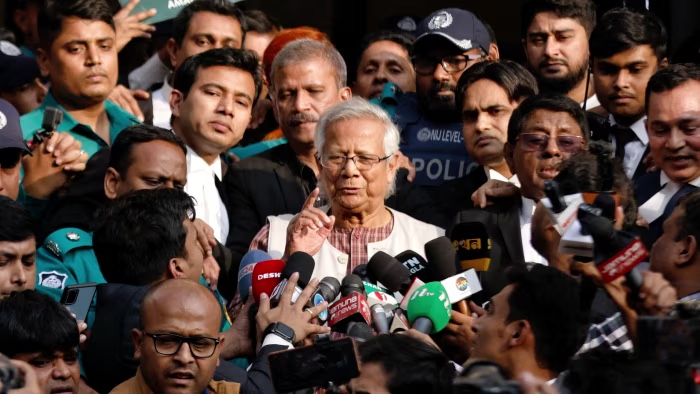Ameer Shahul
Bangladesh’s authoritarian prime minister, Sheikh Hasina, has come full circle, ending her power journey where it began—in India. Muhammad Yunus, Nobel laureate and microfinance pioneer, has been chosen to lead an interim government.
Just a month ago, it was unimaginable that Hasina, who wielded control over the police, judiciary, and state institutions, could be removed and exiled by a military helicopter. When she took office in 2008, she was widely celebrated, including by human rights organisations. However, over time, her reputation deteriorated as she targeted the opposition, particularly the Bangladesh Nationalist Party (BNP), arresting leaders, and stifling dissent. Extrajudicial killings, enforced disappearances, and media suppression became widespread, while allegations of corruption surged.
Under Sheikh Hasina, Bangladesh’s economy surged, driven by Western demand for branded garments and leather goods, as these industries shifted from India and China to Bangladesh, a country with extensivecotton farming and a growing appetite for meat consumption. Despite growing authoritarianism, Hasina maintained significant popular support, or at least created that appearance, especially towards the end of her tenure.
In reality, people grew weary of Hasina constantly invoking her father’s legacy and the Awami League’s practice of favouring those deemed ‘pro-liberation’ for employment and privileges. The party’s obsession with the events of 1971 ultimately contributed to her downfall.
As the daughter of Sheikh Mujibur Rahman, the leader of Bangladesh’s independence movement, Hasina retained the unwavering support of the Awami League, with no other leader rising to challenge her dominance within the party. She skilfully leveraged the party’s historic ties to the independence struggle, transforming the Awami League into a hyper-nationalistic force. During her time in office, she frequently branded opposition parties and dissenters as anti-Bangladesh or pro-Pakistan collaborators.

At least two elections, 2019 and 2024, were won by manipulating the election process and stifling the opposition. She didn’t pick up signals even when the main opposition party, BNP, boycotted the elections in 2024 January.
The trouble started last month when Awami League implemented a quota system for government jobs, reserving 30% of positions for the grandchildren of those who fought in the 1971 war, and another 26% for other socially marginalised groups. This left the majority of students competing for just 44% of the available jobs, fuelling widespread resentment.
In response to student protests in 2018, the government had removed the quota. However, in early July, the High Court ruled this decision unconstitutional. Students suspected that the government was behind the judicial order, leading to renewed protests in the capital and across the country.
As the protests gained momentum, Hasina labelled the students as grandchildren of ‘razakars,’ a term used for collaborators with the Pakistani military. This incensed the students, who responded with the slogan, ‘I am a Razakar. You are a Razakar. Who says so? The Autocrat says so.’
In retaliation, the Awami League’s student wing attacked the protesters, resulting in the deaths of six students on July 16. These killings ignited even larger protests, which the government attempted to suppress with brutal force. Over the next eight days, at least 200 protesters were killed, including more than 30 youngsters.
The government responded by shutting down the internet, imposing a curfew, and deploying the army to enforce it. Although more killings occurred, the situation appeared to stabilise, and the army returned to their barracks. It seemed the unrest might subside, but student leaders called for renewed protests. This time, people from all walks of life joined in, including many who had traditionally supported the Awami League. They had one clear demand: Sheikh Hasina’s resignation.
It seemed to be the end for the prime minister, but in a final, desperate move, the government unleashed the police and the party’s student wing onto the streets once more. The ensuing clashes claimed 300 lives.
What had happened in the final hours still remains unclear, but it’s evident that the usually loyal army realised it had to intervene to maintain order and address the people’s demands. The prime minister was pressured to resign and flee the country on Monday.
The Army Chief, a close relative of Hasina, assumed control and announced the formation of an interim government, with the primary task of steering the country to sanity and order. Yunus was brought in on popular demand as he has been a bete noire of Hasina.
People have hope in Yunus as his efforts to enter politics, first by forming a party, have been prevented by Hasina since 2008. People think that he can lead the country to economic prosperity and create jobs, through very similar efforts of economic prime minister Manmohan Singh had done in India since 1991.
It is true that Yunus understands the rural-driven economy of Bangladesh better than anyone else. But does he have the wit and resilience to navigate a complex political system? Age is not on his side, nor is the geopolitical complexity of being caught between India and China. Addressing the growing unemployment of 190 million people requires much larger and broader initiatives.
However, the immediate challenge will be to restore order in society and build confidence by gaining the support of all sections, including Awami League supporters.
The world is watching.
( Ameer is a journalist, author, and public policy analyst based in Bangalore. He frequently travels to Dhaka and is a close observer of developments in Bangladesh )



